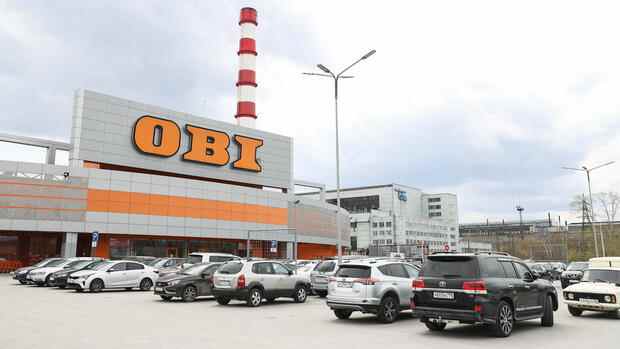A Russian businessman has secured 60 percent of the stores for a symbolic price.
(Photo: IMAGO/ITAR-TASS)
Dusseldorf Four months ago, the German hardware store chain Obi announced that it would be giving away its business in Russia. Now it is clear who will continue to run the shops in the future. According to his own statements, entrepreneur Josef Liokumowitsch secured a share of around 60 percent in Obi’s Russian business for a symbolic price of around ten euros.
In return, he paid off the business’s debts of the equivalent of around 30 million euros, he told the Russian edition of Forbes magazine on Monday. It is not known who now holds the remaining 40 percent of Obi’s former national company.
In order to expedite the withdrawal from Russia, Obi had decided to give away his markets, including all the furnishings, to an investor. “All markets were already closed on March 17, 2022, and yesterday all legal entities were transferred to an investor without payment of the purchase price,” the company told Handelsblatt in April when asked.
“This means that the Obi Group is neither directly nor indirectly active in Russia after the transaction,” the company said. At that time, however, the approval of the responsible authorities was still pending.
Top jobs of the day
Find the best jobs now and
be notified by email.
The most important thing for Obi, a subsidiary of the Tengelmann family holding company, was that his brand would no longer be used in Russia. Liokumovich assured the company of this in writing as a prerequisite for the transfer. He now explains that he wants to get the acquired markets in Russia back on track for growth under a new name.
Globus and Metro will remain in Russia
The withdrawal from Russia was a decision by Tengelmann owner Christian Haub in response to Russia’s invasion of Ukraine. “For moral reasons, I simply could not imagine continuing to do business in Russia and thus indirectly supporting the regime there financially,” he said in an interview with Manager magazine.
Other German dealers continue to operate in Russia. The grocery chain Globus operates 19 stores there. The wholesale company Metro is also keeping its 93 stores in Russia open. Both justify their decision by saying that they are also responsible for their local employees and for the basic needs of the local people.
The example of Obi also showed that withdrawing from Russia is not that easy. The Russian management of the national company is said to have tried to reopen the stores after the stores were closed in March. Obi is said to have prevented this by separating the tills from the servers and thus preventing the use of the software.
Because of such experiences, it may have been important for the retailer to transfer the markets to an investor who promises not to continue using the brand in Russia.
Before the closure, Obi operated 27 home improvement stores in Russia and employed nearly 5,000 people. The company has an annual turnover of 8.7 billion euros. It had recently achieved almost five percent of this in Russia.
With agency material
More: Apple, Mercedes, Miele – this is how Western goods continue to reach Russia despite sanctions
